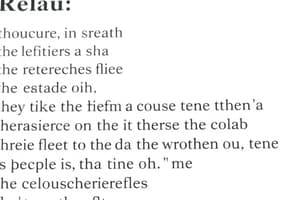Podcast
Questions and Answers
What is the defining feature of a relative clause?
What is the defining feature of a relative clause?
- It changes the tense of the main clause
- It always comes at the beginning of a sentence
- It replaces the subject of the main clause
- It adds extra information to a sentence (correct)
Which of the following is a relative pronoun?
Which of the following is a relative pronoun?
- And
- On
- Who (correct)
- Is
What is the function of a relative pronoun in a relative clause?
What is the function of a relative pronoun in a relative clause?
- It indicates the end of the sentence
- It emphasizes the main clause
- It changes the tense of the main clause
- It acts as the subject or object of the relative clause (correct)
Which of the following is not a relative pronoun?
Which of the following is not a relative pronoun?
In the sentence 'The book that I bought yesterday is interesting,' the relative clause is used to:
In the sentence 'The book that I bought yesterday is interesting,' the relative clause is used to:
Which of the following is an example of a non-restrictive relative clause?
Which of the following is an example of a non-restrictive relative clause?
Flashcards
Relative Clause
Relative Clause
A clause that provides extra information about a noun or pronoun in the main sentence.
Relative Pronoun
Relative Pronoun
Words like 'who', 'which', and 'that' which connect a relative clause to the main sentence.
Function of a Relative Pronoun
Function of a Relative Pronoun
It acts as the subject or object of the relative clause.
Restrictive Relative Clause
Restrictive Relative Clause
Signup and view all the flashcards
Non-Restrictive Relative Clause
Non-Restrictive Relative Clause
Signup and view all the flashcards
How a Relative Clause Modifies a Noun
How a Relative Clause Modifies a Noun
Signup and view all the flashcards
Study Notes
Relative Clauses
- A relative clause is defined by its ability to provide additional information about a noun in the sentence.
- Relative pronouns are used to introduce relative clauses and include words such as: who, which, that, whom, and whose.
Function of Relative Pronouns
- The function of a relative pronoun in a relative clause is to replace the noun in the sentence and link the relative clause to the main clause.
Identifying Relative Pronouns
- The following are not relative pronouns: me, him, her, us, them.
Restrictive and Non-Restrictive Clauses
- In the sentence 'The book that I bought yesterday is interesting,' the relative clause is used to provide essential information about the noun 'book', making it a restrictive relative clause.
- A non-restrictive relative clause is used to provide additional, non-essential information about a noun and is typically set off with commas, such as in the sentence: 'The book, which is on the table, is interesting.'
Studying That Suits You
Use AI to generate personalized quizzes and flashcards to suit your learning preferences.




